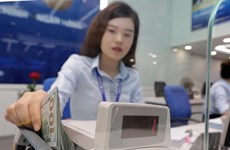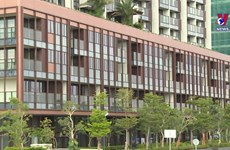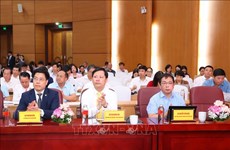Property remains strong, attractive
Vietnam’s property market remains
strong and will attract even more investors in the near future,
delegates said at a two-day international real estate conference that
ended on Oct. 22 in HCM City.
Vietnam’s property market remains
strong and will attract even more investors in the near future,
delegates said at a two-day international real estate conference that
ended on Oct. 22 in HCM City.
Speaking at the conference, Dang Huy Dong, deputy minister of Planning and Investment, said with a population of more than 85 million, the country has a huge need for more housing.
“The fundaments for the residential property market remain strong,” said David Blackhall, deputy managing director of VinaCapital Real Estate.
Affordability and reasonable payment terms are the main drivers in the current marketplace, with low – to mid-end apartments priced between 800 USD and 1,200 USD per sq.m, accounting for 85 percent of all transactions.
Many provinces including Binh Duong, Ninh Thuan, Quang Ngai, Nghe An, Kien Giang, Soc Trang and HCM City have invited investors to keep develop their own property market .
For example, Ninh Thuan province, which is the first Vietnamese province to hire foreign consultants on its tourism and industrial development plans, plans to call for investment in clean energy, tourism, agriculture, aquaculture, forestry, and real estate development.
Nguyen Chi Dung, chairman of the Ninh Thuan People’s Committee, said the province would focus on improving its traffic system as well as creating a convenient investment environment.
With a 120 km-long coastline and weather unsuitable for agricultural production, central Binh Thuan province wants to call for investors to develop tourism property and services, said deputy chairman of the provincial People’s Committee Nguyen Van Thu.
Soc Trang province in the Mekong Delta is looking for outside investment to build tourism, residential, commercial and industrial property projects to meet the increasing demand for industrialisation and modernisation.
However, many obstacles still prevent the property market development, including complicated administrative procedures, poor infrastructure, and difficulties on land clearance and resettlement.
The meeting asked the Government to reduce paperwork and support investors in acquiring land so that projects can finish on schedule.
Phan Huu Thang, former head of the Foreign Investment Agency under the Ministry of Planning and Investment, said localities should map out a master plan that is suitable with their socio-economic situation so that investment promotions will be more effective.
An official from the Ministry of Planning and Investment said the Government would issue policies to encourage the private sector to join hands with the Government to develop infrastructure rather than depend on the state budget or Official Development Assistance funds. Vietnam has many advantages, including diversified geographic characteristics, unique culture and friendly people to develop the tourism industry.
Miquel Angel Perez, chairman of EuroCham Tourism Committee in Vietnam, said improvements could still be made.
“Tourism is a service, we learn how to server. In Vietnam , we don’t serve properly,” he said.
Barriers that make he tourism industry develop in an unsustainable manner are poor infrastructure and services, lack of professional human resources and communications as well as ineffective marketing strategies, according to Martin Kaye, chairman of the Millennium Group and Starbay Holdings Ltd.
He said Vietnamese often look down on people who work as servers, and the attitude needs to change.
The Government needs to focus more on training professional staff for the tourism industry from servers to managers, said Thang, who is also chairman of the Vietnam Tourism Property Association./.
Speaking at the conference, Dang Huy Dong, deputy minister of Planning and Investment, said with a population of more than 85 million, the country has a huge need for more housing.
“The fundaments for the residential property market remain strong,” said David Blackhall, deputy managing director of VinaCapital Real Estate.
Affordability and reasonable payment terms are the main drivers in the current marketplace, with low – to mid-end apartments priced between 800 USD and 1,200 USD per sq.m, accounting for 85 percent of all transactions.
Many provinces including Binh Duong, Ninh Thuan, Quang Ngai, Nghe An, Kien Giang, Soc Trang and HCM City have invited investors to keep develop their own property market .
For example, Ninh Thuan province, which is the first Vietnamese province to hire foreign consultants on its tourism and industrial development plans, plans to call for investment in clean energy, tourism, agriculture, aquaculture, forestry, and real estate development.
Nguyen Chi Dung, chairman of the Ninh Thuan People’s Committee, said the province would focus on improving its traffic system as well as creating a convenient investment environment.
With a 120 km-long coastline and weather unsuitable for agricultural production, central Binh Thuan province wants to call for investors to develop tourism property and services, said deputy chairman of the provincial People’s Committee Nguyen Van Thu.
Soc Trang province in the Mekong Delta is looking for outside investment to build tourism, residential, commercial and industrial property projects to meet the increasing demand for industrialisation and modernisation.
However, many obstacles still prevent the property market development, including complicated administrative procedures, poor infrastructure, and difficulties on land clearance and resettlement.
The meeting asked the Government to reduce paperwork and support investors in acquiring land so that projects can finish on schedule.
Phan Huu Thang, former head of the Foreign Investment Agency under the Ministry of Planning and Investment, said localities should map out a master plan that is suitable with their socio-economic situation so that investment promotions will be more effective.
An official from the Ministry of Planning and Investment said the Government would issue policies to encourage the private sector to join hands with the Government to develop infrastructure rather than depend on the state budget or Official Development Assistance funds. Vietnam has many advantages, including diversified geographic characteristics, unique culture and friendly people to develop the tourism industry.
Miquel Angel Perez, chairman of EuroCham Tourism Committee in Vietnam, said improvements could still be made.
“Tourism is a service, we learn how to server. In Vietnam , we don’t serve properly,” he said.
Barriers that make he tourism industry develop in an unsustainable manner are poor infrastructure and services, lack of professional human resources and communications as well as ineffective marketing strategies, according to Martin Kaye, chairman of the Millennium Group and Starbay Holdings Ltd.
He said Vietnamese often look down on people who work as servers, and the attitude needs to change.
The Government needs to focus more on training professional staff for the tourism industry from servers to managers, said Thang, who is also chairman of the Vietnam Tourism Property Association./.













